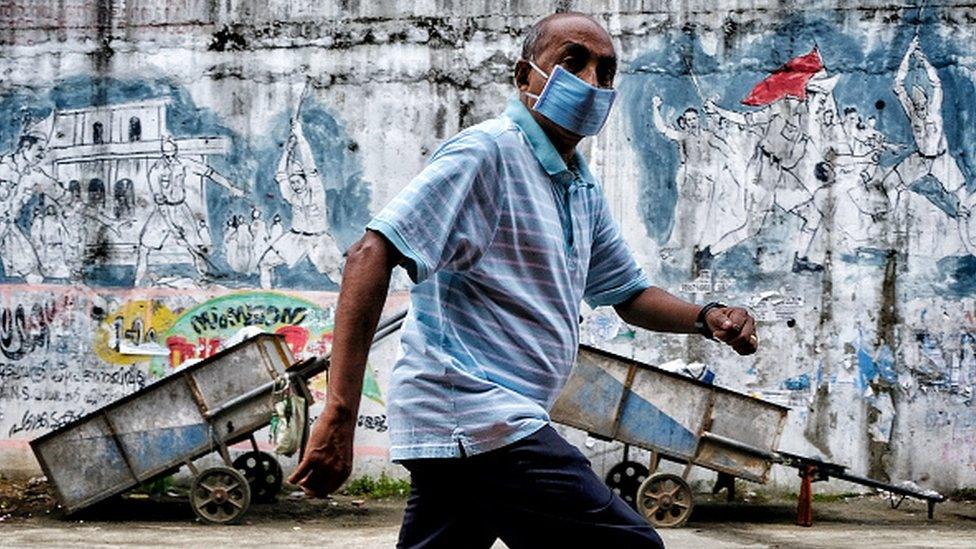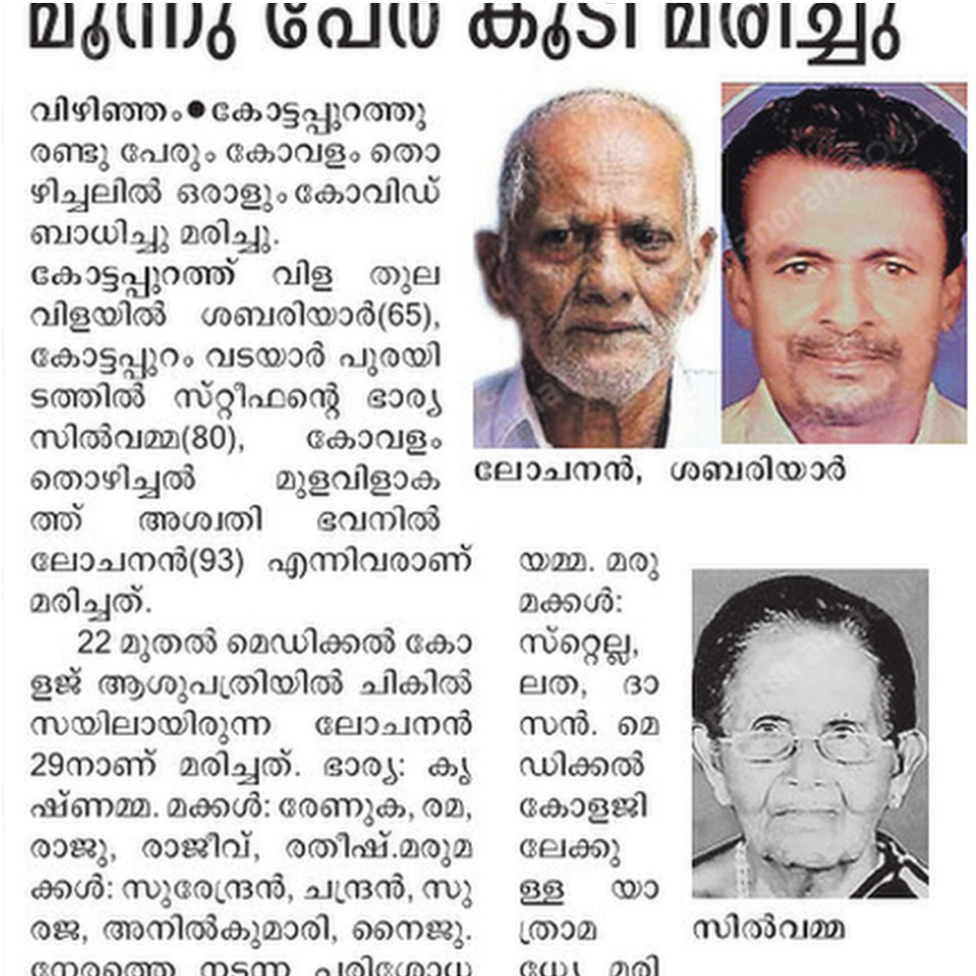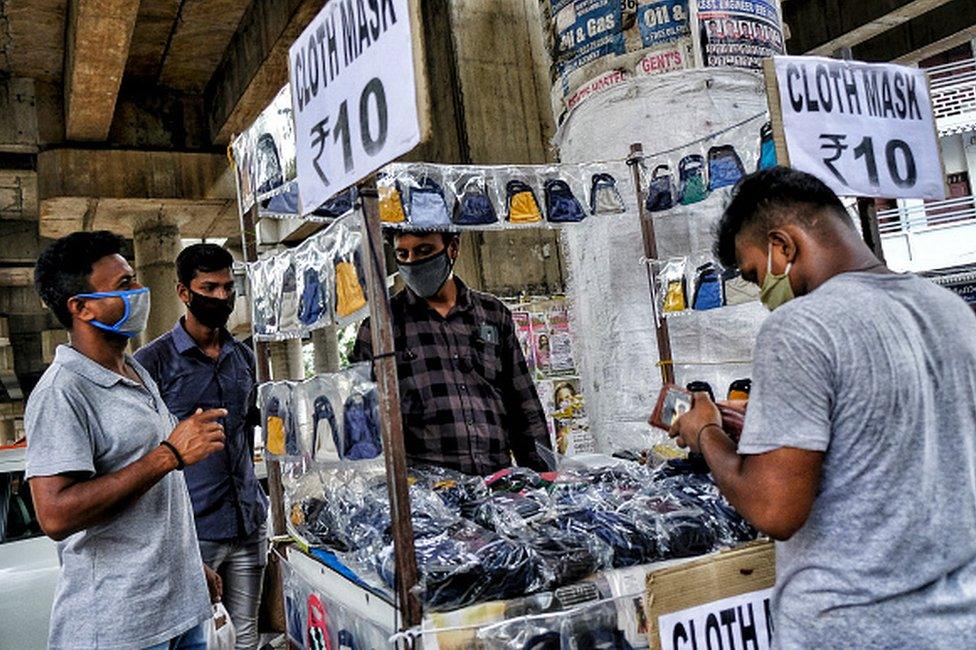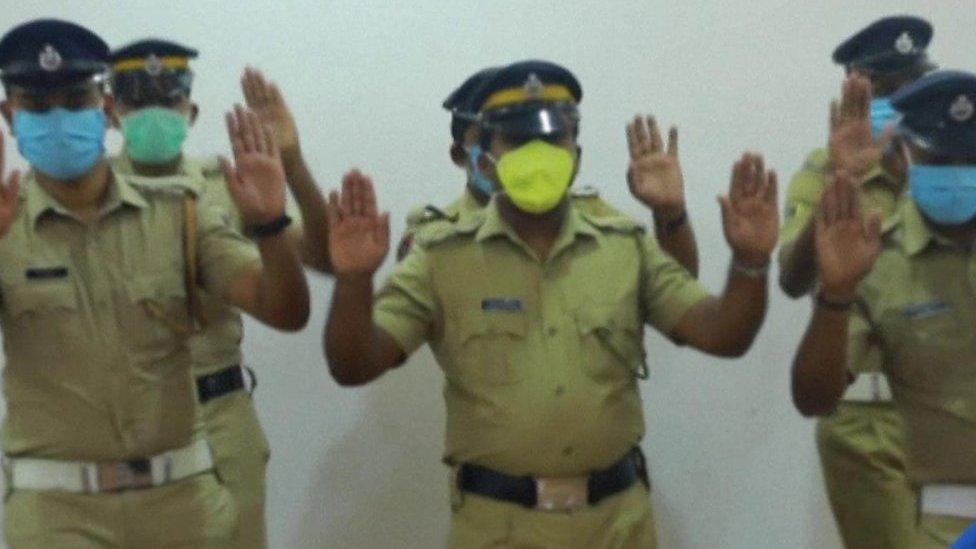India coronavirus: How a group of volunteers 'exposed' hidden Covid-19 deaths
- Published

Kerala has reported more than 530,000 Covid-19 cases
Since March, a group of volunteers in India's southern state of Kerala have trawled local papers and news networks for reports on deaths due to Covid-19.
Led by Dr Arun N Madhavan, a general medicine physician, they checked the district editions of seven local newspapers and followed five news channels unfailingly every day. They took notes on every death reported in the news and obituary notices and diligently entered the details in a spreadsheet, external. "It's a useful method of counting," says Prabhat Jha, of the University of Toronto, who led India's ambitious Million Death Study, one of the largest studies of premature mortality in the world.
As of Thursday night, the volunteers had counted 3,356 deaths from the infection in Kerala, which reported its first Covid-19 case in January and the first casualty in March. But the official death toll from the disease is 1,969.
"We are missing a lot of Covid-19 deaths here," Dr Madhavan told me. He reckons the state has recognised a little more than half of the deaths caused by Covid - and attributed the rest to underlying conditions or co-morbidities.
India's tally of recorded coronavirus cases exceeds 8.9 million, the second-highest in the world behind the US. It has reported more than 130,000 deaths from the infection but the case fatality rate or CFR, which measures deaths among Covid-19 patients, is below 1.5%, among the lowest in the world.
Some experts believe that India's relatively low fatality rate doesn't tell the whole story and allege substantial undercounting in several states. They say suspected cases are not being added to the final count, and deaths from the infection are being carelessly attributed to underlying conditions.

Local newspapers carry detailed reports of Covid-19 deaths
It is striking that Kerala, which has claimed data transparency and has an exhaustive and detailed official Covid-19 dashboard,, external has been undercounting deaths. Dr Madhavan believes under-reporting is rampant. Patients who tested negative "just before they died" and did not belong to Kerala were not counted. Three patients - all men, aged between 65 and 78 - came to his clinic with symptoms and died in hospital in October during treatment. "Their deaths didn't come up in the media or the official count. All of us are missing deaths, but the government is missing them the most," he said.
Rajeev Sadanandan, a top health bureaucrat who is advising the government on handling the pandemic, admits there has been "some" under-reporting of deaths. "We did not count cases who were suffering from terminal or renal diseases and were found to be infected with Covid-19. That was wrong. The protocols are very clear about defining a coronavirus death," he told me.

Read more stories by Soutik Biswas

Mr Sadanandan said Kerala had always prided itself on its transparency of data, and it was this that helped the state fight an outbreak of the vicious Nipah virus in 2018. "We have not consciously hidden data. Some districts might not have reported deaths fearing adverse reactions. It is difficult to hide data in a society which insists on total transparency," he said.
Nearly all countries have undercounted initial Covid-19 deaths by 30 to 50%, says Dr Jha. India's municipalities, he adds, must release total deaths by week with comparison to earlier years to find out the number of excess deaths during this period. Excess deaths are the deaths above normal levels, some of which may have been caused by Covid-19.
Oommen C Kurian of the Observer Research Foundation, a Delhi-based think tank, believes that the undercounting of deaths in Kerala has been "conscious and systematic, and not because of systemic weakness". Despite robust surveillance capacity and a government panel to advise on the matter, "no major reconciliation of deaths has happened yet", he adds.

With local elections around the corner, Kerala is expecting another uptick in infections
"The authorities seem to be convinced that by whatever means the state should keep its reputation as a Covid-19 success story," Mr Kurian said.
In January, Kerala reported India's first Covid-19 case, a medical student who returned from Wuhan in China, where the pandemic began. The number of cases rose steadily and it became a hotspot. But in March, half a dozen states were reporting more cases than the picturesque southern state.
By May, sticking faithfully to the contagion control playbook of test, trace and isolate, and with the help of grassroots networks, Kerala brought down its case count drastically - there were days when it reported no new cases.
The celebrations were premature. Kerala took 110 days to report its first thousand cases. But in mid-July, it was reporting around 800 infections a day. Infections peaked in mid-September. As of 19 November, Kerala had reported 545,641 cases. More than 46,000 people are currently in hospital or under home quarantine. The state is averaging around 60,000 tests a day. With local elections around the corner, authorities fear another uptick in infections.
Some of this under-counting possibly did not serve much purpose. A senior government official, who preferred to remain unnamed, told me that he "estimated that the state had under-reported deaths by 30%". He told me even if the official toll was doubled to factor in uncounted deaths, the number would remain well below that reported by most other states.
That's the irony, Mr Kurian says. "Even if all Covid-19 deaths were to be counted, what Kerala would have achieved up until now in terms of mortality reduction would still be extraordinary".

A SIMPLE GUIDE: How do I protect myself?
IMPACT: What the virus does to the body
ENDGAME: How do we get out of this mess?
WITHOUT SYMPTOMS: The mystery of 'silent spreaders'

- Published18 August 2020
- Published19 March 2020

- Published21 July 2020
